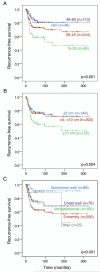A prognostic nomogram for prediction of recurrence in desmoid fibromatosis
- PMID: 23532110
- PMCID: PMC4096320
- DOI: 10.1097/SLA.0b013e31828c8a30
A prognostic nomogram for prediction of recurrence in desmoid fibromatosis
Abstract
Objective: To construct a postoperative nomogram to estimate the risk of local recurrence for patients with desmoid tumors.
Background: The standard management of desmoid tumors is resection, but many recur locally. Other options include observation or novel chemotherapeutics, but little guidance exists on selecting treatment.
Methods: Patients undergoing resection during 1982-2011 for primary or locally recurrent desmoids were identified from a single-institution prospective database. Cox regression analysis was used to assess risk factors and to create a recurrence nomogram, which was validated using an international, multi-institutional data set.
Results: Desmoids were treated surgically in 495 patients (median follow-up of 60 months). Of 439 patients undergoing complete gross resection, 100 (23%) had recurrence. Five-year local recurrence-free survival was 69%. Eight patients died of disease, all after R2 resection. Adjuvant radiation was not associated with improved local recurrence-free survival. In multivariate analysis, factors associated with recurrence were extremity location, young age, and large tumor size, but not margin. Abdominal wall tumors had the best outcome (5-year local recurrence-free survival rate of 91%). Age, site, and size were used to construct a nomogram with concordance index of 0.703 in internal validation and 0.659 in external validation. Integration of additional variables (R1 margin, sex, depth, and primary vs recurrent presentation) did not importantly improve concordance (internal concordance index of 0.707).
Conclusions: A postoperative nomogram including only size, site, and age predicts local recurrence and can aid in counseling patients. Systemic therapies may be appropriate for young patients with large, extremity desmoids, but surgery alone is curative for most abdominal wall lesions.
Figures





References
-
- Wu C, Nik-Amini S, Nadesan P, et al. Aggressive fibromatosis (desmoid tumor) is derived from mesenchymal progenitor cells. Cancer Res. 2010;70(19):7690–8. - PubMed
-
- Li M, Cordon-Cardo C, Gerald WL, et al. Desmoid fibromatosis is a clonal process. Hum Pathol. 1996;27(9):939–43. - PubMed
-
- Tejpar S, Nollet F, Li C, et al. Predominance of beta-catenin mutations and beta-catenin dysregulation in sporadic aggressive fibromatosis (desmoid tumor) Oncogene. 1999;18(47):6615–20. - PubMed
Publication types
MeSH terms
Grants and funding
LinkOut - more resources
Full Text Sources
Other Literature Sources
Medical

